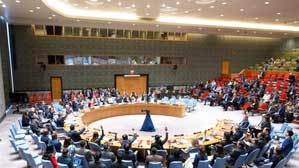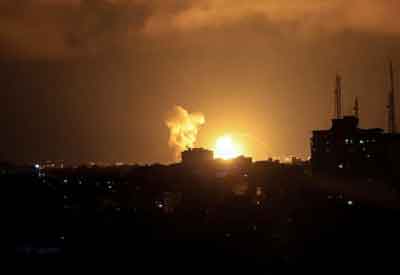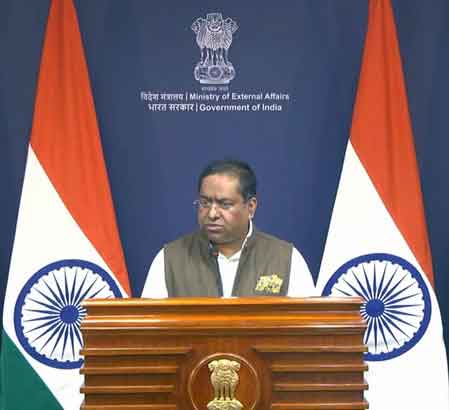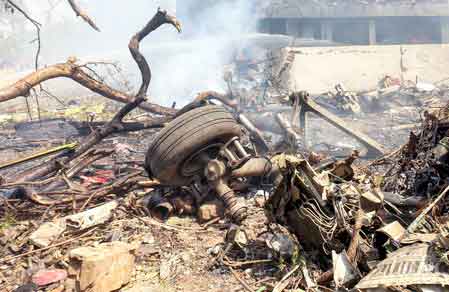Pakistan joins the UN Security Council on Wednesday subtly changing the balance in the world organisation's highest decision-making body and getting a virtual veto power over sanctioning terrorists it harbours.
Elected in June as a non-permanent member, it will replace Japan for a two-year term on one of the two seats for Asia Pacific countries in the Council.
Now Islamabad will not have to rely on Beijing to protect its terrorists like the mastermind of the 26/11 Mumbai attacks, Sajid Mir, at the Islamic State and Al-Qaeda Sanctions Committee, which designates individuals and groups associated with those two organisations as terrorists and imposes sanctions.
Although only permanent members have a veto over decisions of the Council, non-permanent members have a virtual veto in the sanctions committees for terrorism because they act through consensus under accepted norms.
The virtual veto given by the consensus procedure has been denounced, with New Zealand, a former head of the Islamic State-al-Qaeda sanctions panel calling it "the single biggest inhibitor to Committee effectiveness".
India has described the working of the sanctions committees as "subterranean" based on "obscure practices" without legal basis and called for transparency so that the rationale for decisions and how they are made is revealed.
Pakistan also gets a soapbox at the Council to amplify its campaign on Kashmir, an issue it routinely brings up regardless of the subject under discussion, launching virulent attacks on India.
However, this will be more of a continuing publicity stunt because it has been a voice in the wilderness unable to get any other country to join in despite trying to link Kashmir to the Palestine problem.
When Pakistan takes the presidency of the Council in July, it can convene at least two of what are called Signature Events on topics of its choice with high-level participation, both its own and invitees.
Even if it doesn't directly make it an "anti-India" show, it can take a topic that it can manipulate for propaganda on India and Kashmir.
With Japan retiring, there is a subtle change in the balance at the polarised Council where a triumvirate of China, Russia and Pakistan will emerge on many issues.
The other Asian member is South Korea, which like Japan, is pro-Western.
In the General Assembly, Pakistan has tracked China's voting on many issues, especially Ukraine when it joined Beijing in voting on a resolution naming Russia as the aggressor, while generally abstaining.
On Palestine, Pakistan has been a vociferous supporter of its cause and can be expected to raise the decibel in the Council, where it can go head-to-head with the US, which will redouble its backing for Israel under President-elect Donald Trump who has said hardliner Elise Stefanik will be his nominee to be the permanent representative.
Islamabad straddles a dichotomy on terrorism -- while backing or deploying terrorists against India, it denounces terrorism directed against it by groups like the Tehreek-e-Taliban Pakistan (TTP) that it says are based in Afghanistan.
It can be expected to denounce what it describes as Afghanistan's role in terrorism and try to get groups it says target it sanctioned.
The Asia Pacific group rotates its nominees for the Council, which are selected through consensus.
The group's 53 members range from tiny Nauru in the east to Cyprus at the edge of Europe on the West.
After heavy canvassing, Islamabad got the backing of about 20 countries as diverse as China, Saudi Arabia, Iran, Malaysia, the United Arab Emirates, Lebanon and Singapore and the group endorsed it in 2023.
Pakistan received 182 votes in the 193-member General Assembly for its eighth turn on the Council.






Drugs worth Rs 4 crore seized in Tripura, one held
Tripura Police on Sunday seized drugs worth Rs 4 crore and arrested a drug peddler, who ferried the narcotics to the state from Mizoram via southern Assam, an official said.
BJP ally Tipra Motha Party seeks PM Modi's intervention to deport Tripura's illegal immigrants
The Tipra Motha Party (TMP), a tribal based party and an ally of the ruling BJP, demanded Prime Minister Narendra Modi's intervention to identify and push back all illegal Bangladeshi immigrants living in Tripura to the neighbouring country.
Tripura BJP holds candlelight rally against vandalism at Tagore's ancestral home in B'desh
The ruling BJP in Tripura on Sunday held a candlelight rally to protest the recent attack and vandalism of the ancestral home of Nobel laureate Rabindranath Tagore in Bangladesh.
Minister Ratan Lal Nath shares fruits from his orchard with villagers
In a heartwarming gesture that has become a cherished annual tradition, Agriculture and Farmers’ Welfare Minister Ratan Lal Nath on Sunday once again distributed fruits from his personal orchard among the people of his native village, Koroitala in Mohanpur under West District.
IMD issues orange alerts for very heavy rainfall over Tripura
The Meteorological Centre, Agartala has forecasted heavy to very heavy rainfall accompanied by thunderstorms, lightning, and gusty winds over Tripura from 16th to 18th June 2025.
Tripura Police seize Yaba tablets worth Rs 4 Crore, one arrested
In a major operation against drug trafficking, Tripura Police on Sunday seized 80,000 Yaba tablets valued at around Rs 4 crore from a truck at the Churaibari check post in North Tripura district, near the Assam border.
PCC to launch outreach campaign from June 22, highlighting BJP’s failures
In line with the directives of the All India Congress Committee (AICC), the Tripura Pradesh Congress Committee (TPCC) on Sunday announced a state-wide public outreach campaign starting from June 22.
Two drowned in Pune bridge collapse, PM Modi speaks to CM Fadnavis
At least two people were killed, 32 others injured, while a total of 41 people were rescued after they fell into an overflowing river when an old bridge they were crossing collapsed in Maharashtra's Pune district on Sunday.